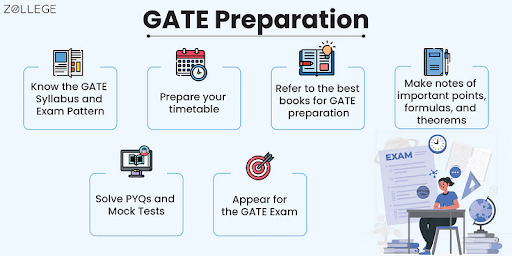How to Prepare for GATE from 1st Year of College?
Table of Contents

The Graduate Aptitude Test in Engineering (GATE) is a highly competitive exam that serves as a gateway to postgraduate programs in engineering, technology, and even management in top institutions like IITs and NITs. Additionally, qualifying for the GATE exam can open doors to lucrative job opportunities in Public Sector Undertakings (PSUs). Starting your GATE exam preparation early, from the 1st year of college, can provide a significant advantage.
Why Start GATE Exam Preparation in the 1st Year?
Starting early ensures that you build a strong foundation, gradually mastering the GATE exam subjects without overwhelming yourself. Moreover, it allows time for conceptual clarity, revision, and mock tests. Here’s how you can systematically prepare for the GATE right from your first year of college:

*Zollege
1. Understand the Basics of the GATE Exam
Before diving into preparation, familiarize yourself with the exam’s structure:
- Exam Pattern: The GATE is a computer-based test with multiple-choice questions (MCQs), numerical answer type (NAT) questions, and multiple-select questions (MSQs).
- GATE Exam Subjects: Choose your subject carefully, as GATE is conducted for multiple streams such as Computer Science, Mechanical Engineering, Civil Engineering, and more.
- GATE Exam Eligibility: You must be in the third or final year of your undergraduate degree or have completed it to appear for the exam. Starting early allows you to pace your preparation over the years.
2. Build a Strong Foundation
Your 1st year of college is the perfect time to solidify your understanding of fundamental concepts. Most of the GATE exam subjects are derived from your undergraduate curriculum. Focus on:
- Core Subjects: Begin with subjects like Mathematics and Basic Engineering Sciences, as they form the foundation for advanced topics.
- Learning Resources: Use standard textbooks and online materials. For example, NPTEL lectures and GATE preparation online courses can be invaluable.
3. Develop a Long-Term Study Plan
GATE preparation is a marathon, not a sprint. Create a roadmap:
- Year 1: Focus on basic subjects and start practicing aptitude and reasoning questions.
- Year 2: Dive deeper into technical subjects and create concise notes.
- Year 3: Begin solving previous year’s GATE papers and take mock tests.
- Year 4: Concentrate on revising and refining weak areas.
4. Use Effective Study Materials
Invest in high-quality study resources:
- Books: Refer to standard textbooks recommended for GATE exam preparation.
- GATE Preparation Online Platforms: Platforms like Unacademy, GradeUp, and Coursera offer tailored GATE preparation courses.
- Mobile Apps: Utilize apps that provide daily quizzes, flashcards, and short videos for quick revision.
5. Master Time Management
Effective time management is critical for balancing college academics and GATE exam preparation:
- Allocate specific hours daily for GATE preparation.
- Prioritize subjects with higher weightage in the GATE.
- Use weekends for in-depth study and practice.
6. Practice Regularly
Consistent practice is key to acing the GATE:
- Question Banks: Solve topic-wise question banks to build accuracy and speed.
- Mock Tests: Begin attempting mock tests early to familiarize yourself with the exam’s format. Regular practice helps in time management and identifies weak areas.
- Previous Year Papers: Solving previous year’s GATE papers gives insights into the type of questions asked and the difficulty level.
7. Strengthen General Aptitude
General aptitude constitutes about 15% of the GATE. Focus on:
- Quantitative Aptitude: Practice arithmetic, algebra, and geometry.
- Logical Reasoning and Verbal Ability: Solve puzzles, practice comprehension passages, and improve vocabulary.
8. Leverage Technology for GATE Preparation
With advancements in technology, GATE preparation online has become more accessible. Benefits include:
- Interactive Learning: Video lectures and live sessions.
- Self-Paced Study: Learn at your convenience.
- Performance Analytics: Online platforms often provide detailed analytics to track your progress.
9. Develop a Habit of Note-Making
Creating concise notes is a game-changer for GATE exam preparation:
- Summarize key formulas, concepts, and shortcuts.
- Use color codes and sticky notes for quick reference.
- Revise these notes regularly.
10. Stay Consistent and Motivated
GATE preparation requires long-term commitment. Here’s how to stay on track:
- Set Short-Term Goals: Break your preparation into weekly or monthly targets.
- Peer Study Groups: Collaborate with like-minded peers to exchange knowledge and stay motivated.
- Reward Yourself: Celebrate small achievements to maintain enthusiasm.
11. Focus on Mental and Physical Well-Being
A healthy mind and body are crucial for effective GATE exam preparation:
- Exercise Regularly: Physical activity improves focus and reduces stress.
- Balanced Diet: Eat nutritious meals to maintain energy levels.
- Take Breaks: Short breaks between study sessions boost productivity.
12. Seek Guidance When Needed
Don’t hesitate to reach out for help:
- Mentorship: Seek guidance from seniors or professionals who have cleared the GATE exam.
- Coaching: Join a reputed coaching institute or enroll in GATE preparation online courses for expert guidance.
- Forums and Communities: Participate in online forums and social media groups dedicated to GATE preparation.
13. Focus on Revision in Later Years
As you progress through college, allocate ample time for revision:
- Revisit key topics regularly to retain concepts.
- Use flashcards and summary notes for quick revisions.
- Revise GATE exam subjects in a structured manner to avoid last-minute panic.
Conclusion
Starting GATE preparation from your 1st year of college gives you an undeniable edge. By understanding the GATE exam’s structure, focusing on fundamentals, leveraging online resources, and maintaining consistency, you can confidently tackle the challenges of the exam. Whether you opt for GATE preparation online or offline, the key is to stay dedicated and strategic.
Begin your journey today to excel in the GATE and unlock a world of opportunities in higher education and professional growth!
Frequently Asked Questions
The GATE (Graduate Aptitude Test in Engineering) exam is primarily used for:
-
- Admission to postgraduate programs (M.Tech/ME/PhD) in top institutes like IITs, NITs, and IISc.
- Recruitment in Public Sector Undertakings (PSUs) for roles in engineering and technology.
- Establishing eligibility for scholarships and financial assistance for higher studies.
GATE and IIT entrance exams like JEE Advanced serve different purposes, so their difficulty levels are subjective:
-
- JEE Advanced: Focuses on admission to undergraduate programs and tests broader fundamental concepts.
- GATE: Tests in-depth subject knowledge at the undergraduate level and is considered challenging due to its specialization and competitive nature.
Both require dedicated preparation, but GATE is more niche and technical.
To be eligible for the GATE exam:
-
- You must have completed or be in the 3rd/4th year of a Bachelor’s degree in Engineering, Technology, or Architecture.
- Final-year students of Master’s programs in Science, Mathematics, Statistics, or Computer Applications are also eligible.
- There is no age limit for the GATE exam.
No, GATE and IIT JAM are different exams:
-
- GATE: For engineering and technology graduates seeking postgraduate education or PSU jobs.
- IIT JAM: For science graduates aiming for Master’s programs (M.Sc.) in IITs and IISc in fields like Physics, Chemistry, Mathematics, and Biotechnology.
Both have unique purposes, subjects, and eligibility criteria.














